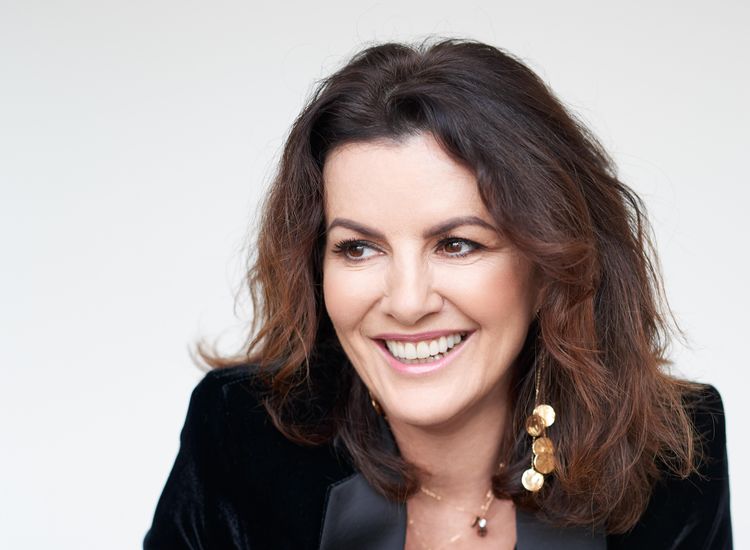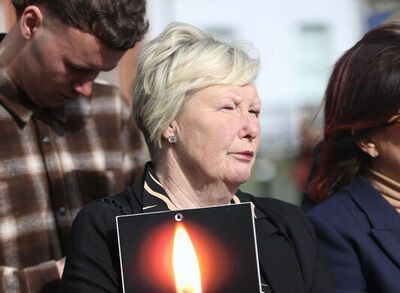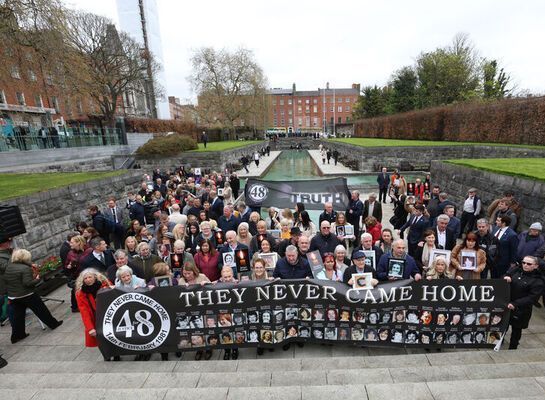Conor McGregor at a press conference at the Staples Center, Los Angeles, on Tuesday.
INPHO/TOM HOGAN
By Dave Hannigan
Thirty-five years ago, Liam Brady stepped up to take a penalty for Juventus against Catanzaro. Although his team-mates included the guts of the side that won the World Cup later that summer, it was the Dubliner who was assigned the pressure job. At a time when Serie A was, by some distance, the greatest league in the world, here was an Irishman scoring a goal to win the scudetto. In a time before satellite television, the closest any of us got to witnessing his achievement was a brief clip on the RTE News that night.
Yet, those of us who follow the game and know our sport acknowledge that Brady’s feat was one of the most remarkable by an Irishman or woman ever. Decades after the event, I spent a day with him in the marble halls of his beloved Highbury where he was then working in youth development. As much as I tried to bring up everything he achieved in Italy, he played it down. He didn’t see the need to brag or boast. His achievements were self-evident and he had too much class to talk himself up. Which made me appreciate his magnificence all the more.
I was 11 when he scored that goal. An 11-year-old Irish boy today thinks the epitome of athletic greatness is a foul-mouthed thug in a specially-made designer suit that has the words “Fxxk you!” stitched into it as pinstripes, using racist language to troll an opponent to sell tickets to his show. Watching Conor McGregor embarrass himself in his race to the bottom with Floyd Mayweather last week, I shuddered at the thought that there is an entire generation who think this is, somehow, some way, the essence of Irish greatness. No, it isn’t. It doesn’t have to be. It shouldn’t be.
[caption id="attachment_89595" align="alignnone" width="203"]
When I think of Irish greatness in a sporting arena, there is no shortage of examples, each one shot through with humility and grace and class. Turn off McGregor and Mayweather and their execrable carnival barker impressions besmirching the sporting landscape and show the kids a video of Paul McGrath against Italy in Giants Stadium in 1994. That is athletic greatness. That is a demonstration of the indomitability of the spirit that we all hope is part of Irishness, an individual overcoming an ailing body to carry his team-mates to a famous victory.
Look at that and measure it against the cringe-inducing racist rhetoric of McGregor shouting, “Dance for me boy!” at an African-American. Compare the two and shudder at the future of Ireland that there are young men and women out there who think this mixed martial artist represents anything good about the country. Anything.
When you are finished showing the children and the young adults who should know better but don’t the footage of McGrath, stay on YouTube. Lash on the night Barry McGuigan took down Eusebio Pedroza at Loftus Road in London. Explain to them what a tough time the eighties was for Ireland and for Irish people all over the world and then tell them how much that meant. Seeing an Irishman win a genuine world boxing title and then seeing how he conducted himself in the aftermath. The class. The dignity in victory and (later) in defeat.
Show them McGuigan now and make them understand the way he behaves around Carl Frampton (a man who has achieved a lot more than McGregor) and try to get them to see there is a better way to be great than shouting obscenities, dancing around stages like an eejit and always reaching for the lowest common denominator when trying to make a buck. There is an alternative to playing the gombeen man and wearing suits with swear words on them like some 12 year old in desperate need of attention from his parents and teachers.
Of course, the wonder of modern technology is that we can access as much tape as we want of Irish athletic greatness to show how far McGregor is from great and how oafishness of his calibre is not and never has been a part of the Irish sporting psyche.
Here’s Roy Keane against Juventus in Turin in 1999 devoting himself to getting his team to a Champions’ League final he would have to miss. Watch the whole game, see how his intensity only increased after the yellow card ensured he’d miss the one match he coveted most of all. Take that in, recite the Sultans of Ping lyric, “A man can have no greater love than give 90 minutes for his friends”, and then show them how diffident he was during the subsequent celebrations in Barcelona, unwilling to hijack glory even after he’d made such a contribution to getting his team there.
Contrast that with McGregor’s risible Flurry Knox impression on our screens this past week and wonder which one represents Ireland better.
There are dozens more examples. Did Henry Shefflin ever boast of his own greatness? Is there a recording anywhere of Jimmy Barry-Murphy talking up his myriad feats in hurling and football? In her pomp, did Sonia O’Sullivan ever have to tell us how great she was to be mixing it with the world’s best runners or did she just get on with the job and let us all see for ourselves how fantastic she was? What about the O’Donovan brothers from Skibbereen? How come they don’t thump their chests and roar and bellow to try to impress us? Show the kids those lads talking down their wondrous feats and make the young ones understand true Irish greatness never came pockmarked by arrogance and tomfoolery.
For four consecutive days last week, the world was subjected to an Irishman using every available offensive term for female genitalia, repeatedly calling an opponent a bitch and describing women as hoes. He is, his apologists would have us believe, one of the greatest athletes Ireland has ever produced. He can keep telling himself and the gullible hordes that. The rest of us know better.










